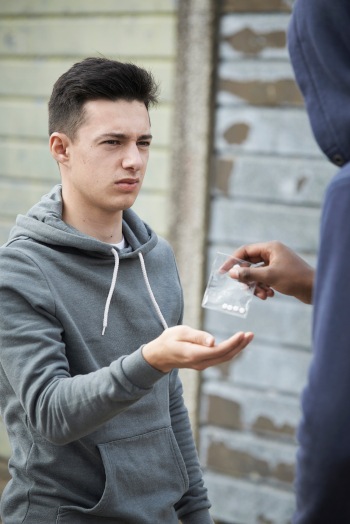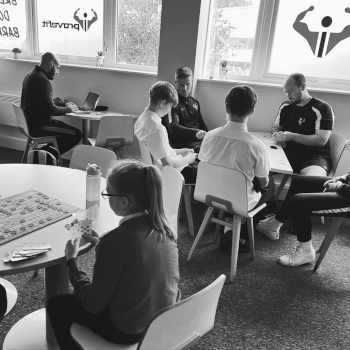The exploitation of young people, particularly for criminal activities, is a sinister practice and one which exists on our streets here in Wiltshire, and across the UK.
This practice not only puts vulnerable individuals at risk, but it feeds a cycle of crime and violence.
This week, we’re highlighting the issues surrounding the exploitation of young people.
Understanding How Young People Are Targeted
Young people are often enticed and trapped in criminal undertakings through a manipulative process that preys on their vulnerabilities.
These manipulations are sophisticated, designed to entangle those most at risk—typically those who are socially or economically disadvantaged, or those seeking a sense of belonging they feel is missing from their lives.
The people behind these schemes are also extremely capable of identifying potential targets, using methods such as grooming, where promises of wealth, protection, or a familial bond are made.
Initially, these promises might appear as good intentions, aimed at fulfilling an unmet need in the young person’s life.
However, once entangled, these individuals find themselves in a reality far removed from the promises made, facing coercion and manipulation that leverages their vulnerabilities to ensure their compliance.
This calculated targeting is the first step in a series of exploitative actions, leading many young people into a downward spiral of criminality from which escape becomes a formidable challenge.
County Lines – The Frontline of Youth Criminal Exploitation
County lines represent a significant avenue through which the exploitation of young people for criminal activities manifests within the UK.
This operation sees criminal networks coerce youths to distribute illegal drugs from cities to suburban and rural areas, capitalising on their vulnerability.
These young individuals, often oblivious to the full extent of their exploitation, are transported far from their homes. Thereby increasing their dependency on their exploiters and complicating their escape from these networks.
They are thrust into dangerous environments, where they face severe threats and violence as a means of control, making if challenging, or impossible, for the young person to leave.

This form of exploitation highlights the urgent need for targeted interventions and support systems to dismantle these operations and rescue the young lives ensnared by them.
The Psychological and Social Impact on Young Victims
The young people who find themselves ensnared in this web of criminal exploitation suffer both mental and emotional scars that extend far beyond their immediate circumstances.
The relentless cycle of coercion and crime inflicts severe trauma. Leaving young individuals to grapple with feelings of fear, betrayal, and a deep-rooted sense of isolation.
This is made worse by the societal stigma attached to any criminal involvement. This often leads to a withdrawal from supportive community or familial ties, further deepening their sense of alienation.
The enduring impact on their mental health cannot be understated. As a result, symptoms of anxiety, depression, and post-traumatic stress disorder can occur.
This hampers their ability to envisage a life beyond their current predicament. Further, it significantly obstructs their journey towards rehabilitation and reintegration into society.

Strategies for Prevention and Support
Preventing the exploitation of young individuals and supporting those who have been entangled in criminal networks demands a multifaceted approach.
Engaging in educational initiatives that inform about the dangers and indicators of exploitation is vital.
These should be complemented by outreach programmes aimed at those most at risk. To provide them with the knowledge to recognise and resist manipulation. In addition, fostering strong community links can serve as a protective barrier. Subsequenly, this creates an environment where young people feel supported and valued, thus reducing their vulnerability to exploitation.
Equally important is the provision of comprehensive support services tailored to the needs of those affected. This includes offering therapeutic counselling to address the psychological trauma experienced. This is delivered alongside practical assistance. For example, secure housing and opportunities for skills development and education.
These efforts aim to empower young individuals, enabling them to envisage and work towards a positive future. Free from the chains of exploitation.
Collaborative work between agencies, charities, local communities, and mentoring services like the one we provide here at Iprovefit can underpin these strategies. Thereby ensuring a coherent and effective response to both prevent exploitation and support those on the path to recovery.
Why Iprovefit?
In the last decade Iprovefit has seen the impact of exploitation on young people. Many fall victim as they try to navigate the difficulties of fitting in, sustaining themselves or lacking role models to give an alternative view.
At Iprovefit we have successfully helped many young people navigate through life’s challenges. We have been instrumental in giving them direction. Subsequently, allowing them to question the intentions of the relationships that may lead to exploitation. Or for those already involved, to provide awareness of the potential risks surrounding the choices being made.
In our experience, it’s important to remember that most young people don’t feel they are being exploited. They believe they are making a conscious choice or that the person exploiting them genuinely cares about them.
We must break through the barriers of this unhealthy mindset and help young people to understand what a caring relationship should look like.
Many, however, may not be aware of this based on their circumstances.
Give our team a call today and book an introduction session to find out how we can the young person in your life.
Click here to register your interest and one of our team will be in touch. Alternatively, you can call us 0333 023 2215 or send an email to info@iprovefit.com

